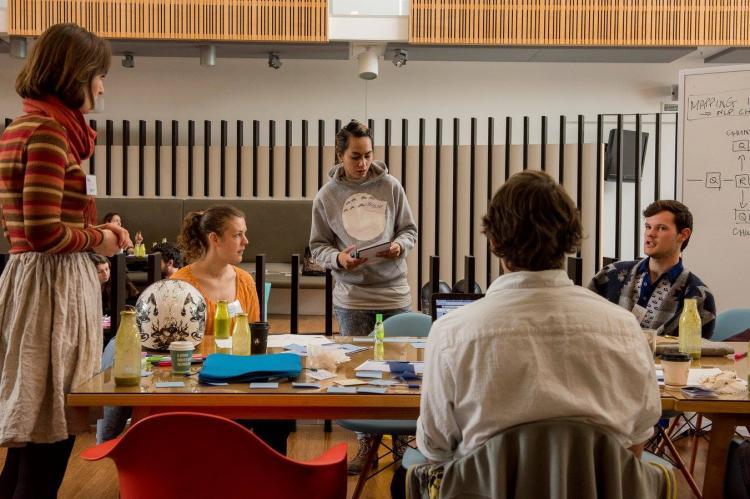- AUTHORDeep South Challenge Engagement programme – update
- December 23 2015
Deep South Challenge Engagement programme – update

The Deep South Challenge (DSC) has five programmes, one of which is focused on “Engagement”, a word that means many things to many people. Over the past six months, we have been putting considerable thought into what “engagement” means in the context of this Challenge, and what we hope to achieve through the Engagement programme.
This has led to the development of an Engagement Strategy, which was endorsed by the Board in December 2015, subject to some minor amendments and feedback from our Independent Science Panel in February 2016. We intend to make the strategy document publicly available, and cite-able, after the DSC Board meeting in March 2016. A draft version of the strategy is, however, available upon request from the programme lead for Engagement, Rhian Salmon.
Key aspects of the strategy (all still pending final finessing), include a high level goal, six objectives, and four workstreams.
The high-level goal of the Engagement programme is to contribute to improving New Zealanders’ ability and capacity to make decisions informed by DSC-related research, which includes enhanced modelling capacity, improved predictions of future climate and its impacts and implications, and new understanding of Antarctic and Southern Ocean processes.
This will be delivered by focusing on six objectives:
- Ensuring that DSC research responds to the needs of New Zealanders
- Establishing broad public communication and two-way engagement about DSC-related climate change research to increase New Zealanders’ awareness of, and ability to access and use, DSC research outcomes such that they inform climate-related decisions
- Strengthening channels with key audiences and sectors with regard to DSC-related climate change research to build sector-specific interest in, and capacity to understand and use, this information to enable more informed decision-making
- Building capability for engagement about climate change among experts and intermediaries (especially related to modeling, impacts and implications, and adaptation), and contributing expertise to engagement led by external partners, to ensure effective communication and dialogue through and beyond the duration of the DSC
- Maintaining communication of DSC progress (to the public, key stakeholders, funders, DSC researchers and committees)
- Evaluating the DSC engagement programme to ensure that the programme delivers on its goal, and contributing to academic literature through research on factors enhancing the effectiveness of climate-change engagement.
These objectives will be delivered through four workstreams, which will operate under the oversight of the Science Leadership Team, Technical Advisory Committee on Engagement, and a representative-user group.
The four workstreams identify areas of coordination that require a particular skill-set. These workstreams will be coordinated by between 1-4 positions, with the exact distribution of work depending on applicants, their capabilities, and availability. The four workstreams are:
Broad public and Internal Engagement; responsible for organisation of, partnering with, and development of content for, engagement activities for the general public. This workstream will also have responsibility for media and social-media, internal communications processes, establishing linkages with other partners in climate change engagement, coordination of the advisory committee, and funding processes.
Capacity-building for Engagement will be responsible for providing training and support to a range of intermediaries and other community and sector leaders to enable them to communicate more accurately and effectively and to facilitate climate change engagement activities across New Zealand. The DSC will seek to co-fund these capacity-building activities by partnering with external organisations with common interests and goals.
Tailored Engagement will work closely with, and be supplemented by, the emerging Impacts & Implications programme to ensure key decision-making groups are informing, and informed by, DSC-related science. During 2016, the Climate Change Impacts and Implications (CCII) programme will share its outcomes and learnings, which include not only biogeophysical impacts and their implications for adaptation, but also identification of key decision-making areas and audiences. This workstream will ensure these outcomes can be upscaled to better support decision-making about climate change in key sectors across New Zealand. It will also be responsible for coordination of the representative user group.
Evaluation and Research will ensure that the Engagement programme is achieving its goal and objectives by continually assessing the effectiveness of engagement activities, the results of which will also inform research on effective engagement on climate change.
More details on funding opportunities for activities that help fulfil the goal and objectives will be made available in January. There will be two main routes for this:
- Major projects that require considerable investment are advised to apply via the DSC Contestable process. More details can be found on the Deep South website here.
- The Engagement programme will also establish a process in early 2016 whereby applicants can apply for smaller levels of funding (eg $1-10k). This will be assessed quarterly, with a maximum of $80k distributed across a given year.
Contact
For more information on the Engagement programme and its implementation (including employment and funding opportunities), please email Rhian Salmon.